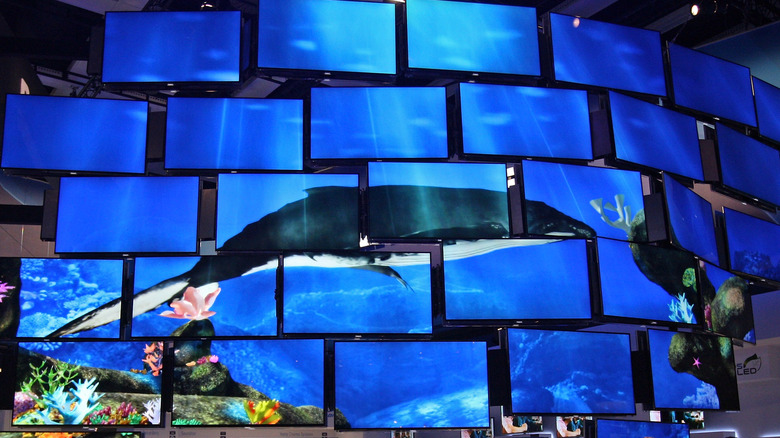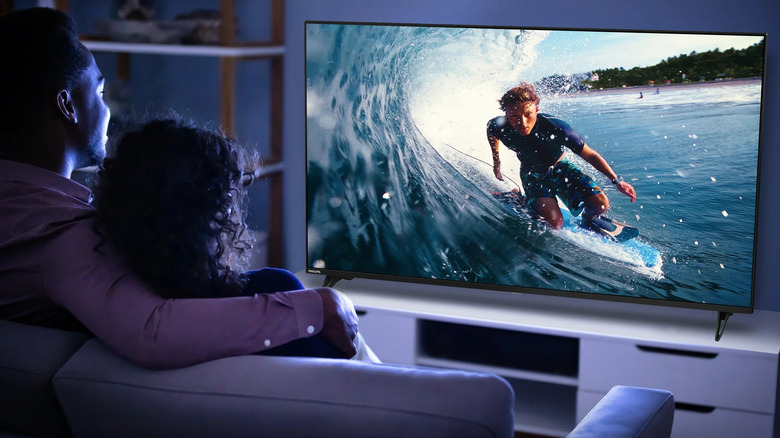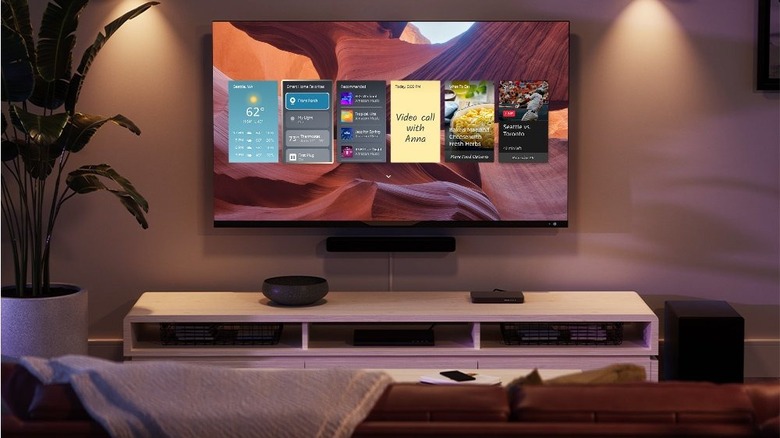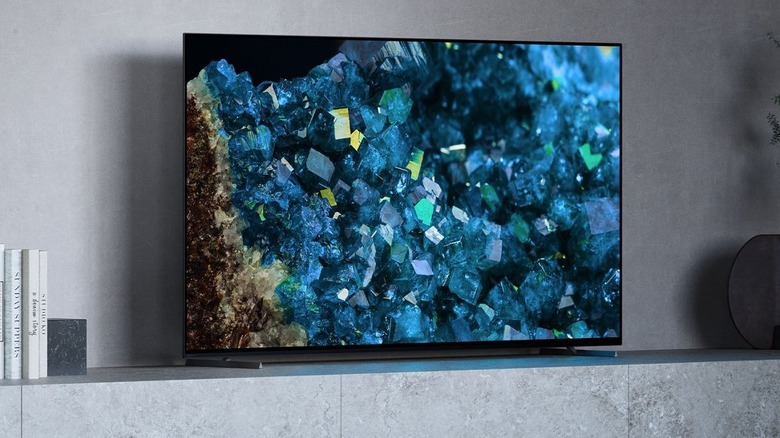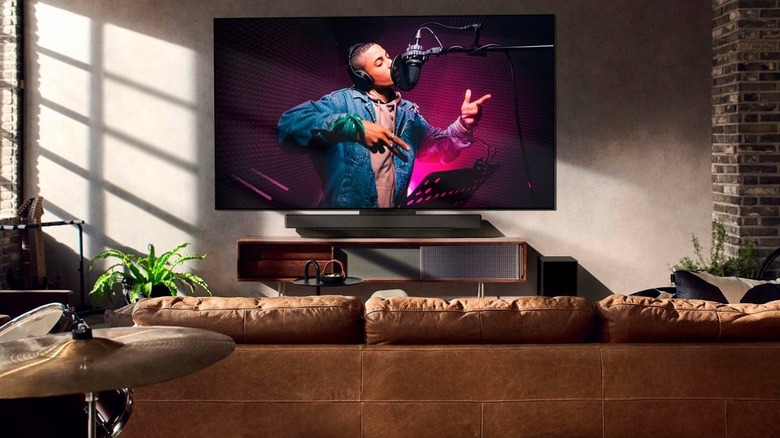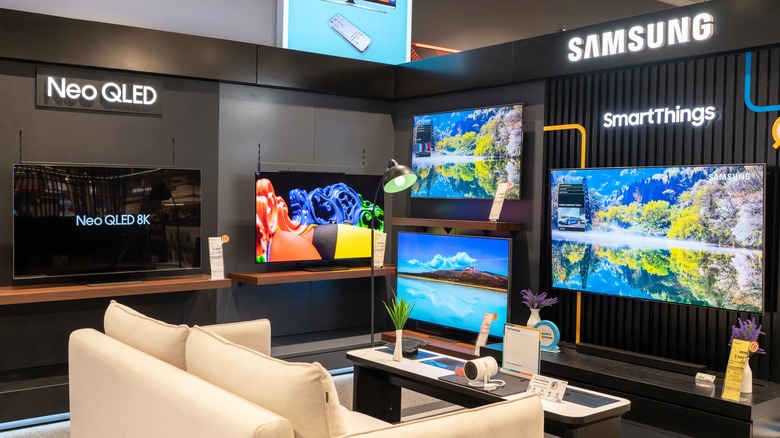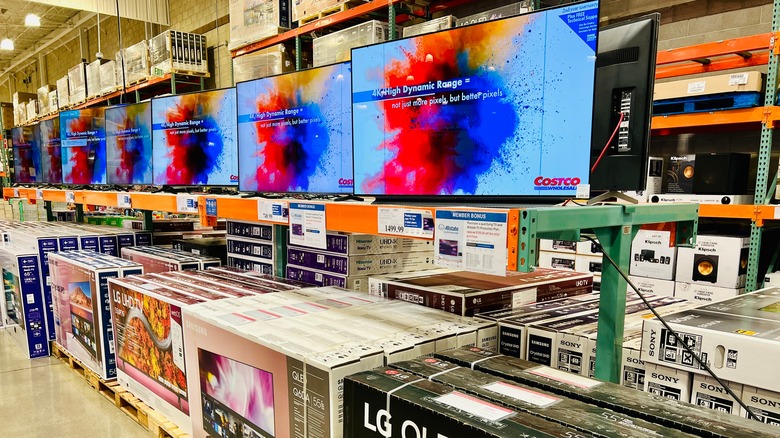The 5 Most Reliable TV Brands, According To Consumer Reports
We may receive a commission on purchases made from links.
Consumer Reports has long had a reputation for fair, unbiased, and honest reviews of all sorts of consumer products, including various consumer electronics. It stands out in particular because it's a nonprofit organization that doesn't accept ads or monetize product recommendations with affiliate links, so there's a different level of trust for Consumer Reports compared to the competition. This trust extends to their research into TVs, an area where Consumer Reports reviews brands that don't get much attention elsewhere.
Each Consumer Reports TV review features a list of the top TV brands based on predicted reliability and owner satisfaction. For the reliability score, the publication uses "a statistical model that estimates problem rates by the end of the 5th year of ownership for TVs." This is not indicative of picture quality or overall positive reviews, as the inclusion of some surprising budget brands and poor customer satisfaction scores on some of these TVs indicate. It's also unclear exactly how Consumer Reports measures predicted reliability, as many of the budget brands they recommend by that metric are among the cheapest TVs on the market.
With that out of the way, let's go over each brand that received a positive predicted reliability from Consumer Reports.
Philips
This one comes a bit out of left field — Philips, which exists these days mainly as a budget TV line using a once-major brand name, scored a perfect five out of five in Consumer Reports' predicted reliability rankings. These TVs aren't made by the Netherlands-based Philips company that once teamed up with Sony to develop the CD, DVD, and Blu-ray disc, though. Instead, the Philips brand name is being licensed by Funai Electric, which has long used this business model, selling Philips branded TVs alongside Kodak branded printers and scanners.
Though Funai may make Philips branded TVs that are ostensibly robust and long-lasting, how well they perform in terms of picture quality is a different matter. The Owner Satisfaction side of the Consumer Reports chart that also features the aforementioned Predicted Reliability measurement where Philips shined gives it just a two out of five score, which means that those owners absolutely don't recommend buying Philips TVs. So despite the high reliability rating, it seems like it's not the most satisfying TV.
The highest rated Philips product for which we could find a full Consumer Reports review was the 65PFL5703, a since-discontinued 65-inch 4K TV running an unknown smart OS. Overall, it got a score of just 57 out of 100, with praise for the picture clarity, color accuracy, and viewing angles, while black levels, HDR performance, backlight uniformity, and the smart OS features fared much worse.
Insignia
Another budget brand that fared particularly well by Consumer Reports' Predicted Reliability metric is Insignia, Best Buy's house brand. It scored a perfect five out of five on that scale, but it didn't fare nearly as well on owner satisfaction, with a two out of five rating.
In a sense, it's somewhat surprising that Consumer Reports would include Insignia in the reliability rankings, as, according to the Consumer Reports' own guide to TV brands, there's no singular manufacturer building the TVs for Best Buy. So it's not like an assessment of Insignia is necessarily uniform the way it would be for Element, which produces almost all of Walmart's Onn-branded TVs. The specifics are incredibly opaque, to boot.
The most visible professional reviews of Insignia TVs comes from RTINGS, which looked at the 2022 version of the flagship F30 series. For mixed usage, the Insignia scored just 6.1 out of 10, with consistent viewing angles cited as a pro amidst a longer list of cons, like poor contrast ratio and black uniformity, insufficient brightness to combat glare, and flickering picture. RTINGS did appreciate game mode, where the TV had a delightfully low input lag of about 10 to 11 milliseconds, but that wasn't enough to pull the rating up. Tom's Guide, meanwhile, clocked the F30 as having inferior peak brightness and contrast levels to similarly-priced TVs from Hisense and Vizio.
Sony
Also topping the Consumer Reports predicted reliability list is a brand name that makes its own TVs, has a decades-long reputation for high quality across the entire consumer electronics landscape, and sells some of the most expensive, premium TVs on the market. That would be Sony, which also got a perfect five out of five in Consumer Reports' customer satisfaction metric, as well.
In Consumer Reports' 2024 list of recommended TVs, it singled out the Sony XR-65A95L — which is a 65-inch model of the manufacturer's flagship OLED TV for 2023 — giving it a very high overall score of 86 out of 100. In addition to the expected great Sony OLED performance when it comes to black levels and HDR performance, the review blurb also notes that the TV is a newer quantum dot OLED model. with improved color as a result.
As for other professional reviewers, ZDNet Editor in Chief Jason Hiner recommends the Sony X90L series as the best overall TV on the market. Retailing for $1,299.99 on Amazon for a 65-inch model, this LED-backlit series is not nearly as expensive as the aforementioned A95L series, as the 65-inch model costs $3,499.99 on Best Buy. The ZDNet article also puts it ahead of the comparably priced TCL QM8 and Hisense U8K lines, with the Sony having superior color accuracy and a far better remote. Sony's image processing for upscaling lower-resolution videos is also cited as being particularly good and a significant differentiator from what TCL and Hisense have to offer.
LG
Another TV brand with high marks from Consumer Reports is LG, which scored a perfect five out of five on both predicted reliability and owner satisfaction. The South Korean company is, along with Sony and Samsung, one of the big three makers of OLED TVs, with its more premium TVs being particularly well-received.
Elsewhere at Consumer Reports, its best TVs of 2024 list includes a whopping four different LG models, with the OLED65G4SUB, the 65-inch flagship OLED for 2024, taking the top spot. Consumer Reports noted that thanks to what LG is calling its microlens array technology, it's the company's brightest OLED TV that they've tried, and the outlet gave it a score of 88 out of 100. The next OLED model down, the OLED65C4PUA, scored just a tick lower with an 87, as did the G3 series, which was 2023's flagship OLED TV line, while the C3, its entry level OLED, held strong but slightly lower at 85.
That C3 series may very well be the best value in OLED TVs. Wired gave it a particularly strong recommendation in a December 2023 review that awarded the line a nine out of 10 score and a Wired Recommends badge, while CNET gave it an 8.6 out of 10 in a review that stressed the value proposition. "You could pay more for a nice TV, but you probably shouldn't," reads the sub-headline of the CNET review. Finally, at Tom's Guide, it scored 4.5 stars out of five and an Editor's Choice badge.
Samsung
Another company earning perfect scores for its TVs by Consumer Reports predicted reliability and owner satisfaction metrics is Samsung, the South Korean megacorp with tendrils across the entire consumer electronics landscape. It had four TVs in Consumer Reports' best of 2024 list, topped by the QN65S90D, the 65-inch OLED model that fills the space just below Samsung's flagship S90D OLED line. Consumer Reports gave that TV an 88 score out of 100, with the blurb touting its overall picture quality as well as its gaming and picture post-processing features.
Samsung's 2024 flagship S95D OLED line, represented by the QN65S95D 65-inch model, scored two ticks lower at 86, with Consumer Reports praising not just the picture quality but also its remote with solar charging and the above-average 4.2.2 channel sound system that can also be used to complement a Samsung soundbar. Samsung's 2023 sub-flagship OLED and its 2024 flagship Neo QLED TV also made the list with scores over 80.
As for other professional reviews, the unusually thorough and typically difficult to impress folks at RTINGS gave the QN65S95D a 9.0 out of 10 score for mixed usage. In particular, the review cited reference-quality contrast and black levels, wide viewing angles, great HDR performance and overall brightness, and bright, accurate colors as points in the flagship TV's favor. Trusted Reviews, meanwhile, gave the same TV a perfect five stars out of five score and a Highly Recommended badge, citing its "stunning brightness and contrast," gaming features, and design.
A note on everyone else
Several other brands drew positive scores by Consumer Reports' predicted reliability metric, mainly scoring four out of five. The only other brand that scored a perfect five was RCA, which is currently just a licensed name for Curtis International's TVs. We elected not to do a full write-up on RCA because there don't seem to be any RCA-branded TVs currently in production. You might find some stragglers at Amazon, but they're few and far between, there's nothing current, and no TVs come up when you search RCA's other listed retail partner, Walmart, for RCA. In addition, RCA did miserably by Consumer Reports' owner satisfaction metric, scoring just a one out of five.
Scoring a four out of five on predicted reliability were Sceptre, Westinghouse, JVC, Magnavox, and Toshiba. The latter four are just licensed brand names — by TongFang, Shenzhen MTC, Funai Electric, and Hisense, respectively — but it's not clear who makes Sceptre's TVs. All four of those brands scored poorly on customer satisfaction, though, earning either a one or a two.
Hisense, TCL, Element, Vizio, and Polaroid all scored a three on predicted reliability, and all but Polaroid — whoever holds that license appears to have exited the U.S. market, regardless – make their own TVs. TCL (four), Hisense (three), and Vizio (also three) all scored in the upper half of owner satisfaction, while Polaroid scored a dismal one out of five.
